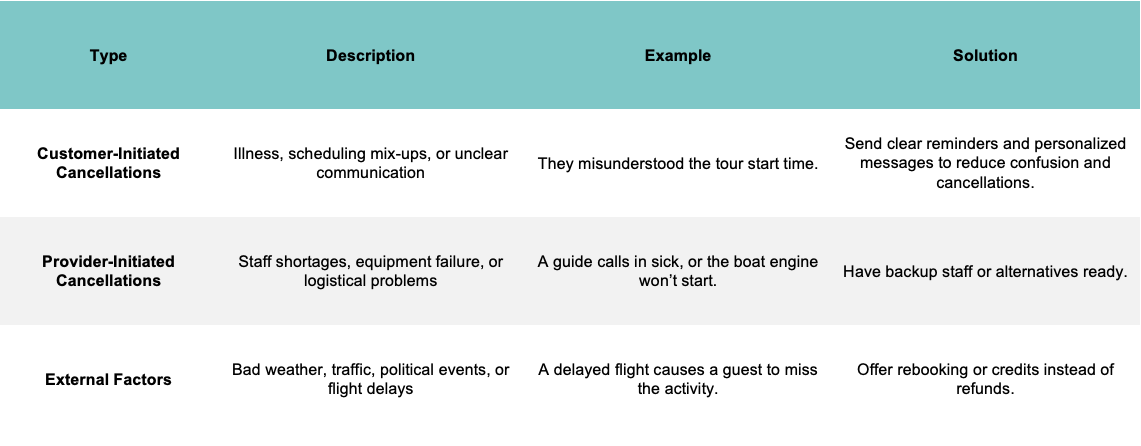You’ve probably had your fair share of last-minute cancellations: those dreaded emails or calls that come just when you thought your day was sorted.
If you’ve been wondering how tour and activity providers can reduce cancellations, you’re definitely not alone. Such revenue-impacting disruptions can disrupt your entire booking process.
Because cancellations are like last-minute storm clouds, they disrupt the forecast unless you're prepared. Here are strategies to reduce those high-frequency, logistics-based surprises. Let’s dive in and cut down those cancellations for good.
How to Minimize Last-minute Cancellations
Reducing cancellations is about having the right processes, policies, and tools in place. Let’s walk you through the best practices to reduce no-shows that will give you more control and peace of mind.
Strengthen Booking and Cancellation Policies
Cancellations are often caused by unclear policies, so clarity is key.
Example of weak vs. strong policy:
- Vague policy: “You may cancel if needed. Refunds might apply.”
- Strong policy: “Cancellations made at least 48 hours in advance receive a full refund. Cancellations within 48 hours are non-refundable. Rescheduling is allowed once, up to 24 hours before.”
A clear policy builds trust. A vague one? Not so much. Write your terms and conditions for your tour business as detailed as possible.
Analyze Your Cancellation Patterns
Want fewer surprises? Use your data.
Behavioral patterns can be tracked using CRM software. These analytics platforms can help you see which bookings are linked to payment timing and deposits, which can help you identify if these are low-commitment bookings.
Other cancellation patterns to analyze include:
- Time of year or seasonal spikes
- Specific tours or packages with higher cancellation rates
- Cancellations from last-minute bookings
- Guests who didn’t receive reminders or confirmations
- Bookings from channels with higher no-show rates
Understand which reasons, circumstances, and patterns are driving your cancellations, so you’ll be ready to anticipate and adapt your strategy.
Improve Pre-Trip Communication
Cancellations can be reduced with clear communication. Use emails, texts, and app notifications. Time them at 48 and 24 hours before the tour.
Say you have an upcoming bike tour, and one guy has almost forgotten about it. It's a good thing you sent a simple text reminder. Yep, cancellations can be prevented through real-time reminders.
Offer Travel Insurance and Upsell Flexibility
Give guests a backup plan. For example, offer $10 upgrades for flexibility, rescheduling, or travel insurance coverage.
This peace of mind helps with commitment. Why? Because cancellations are minimized by flexible rescheduling options. And when plans do change, guests are more likely to adjust than to cancel entirely.
Utilize Dynamic Pricing and Deposits
Some people want a deal, so they might accept a discount in exchange for not receiving refunds. Offer dynamic pricing, such as:
- Cheaper non-refundable rates
- Hold a deposit to lock in their booking
The requirement of deposits often reduces frictionless cancellations, which also allows for better forecasting and fewer no-shows.
Strengthen Customer Trust and Experience
Cancellations may result from low customer confidence. Personalized emails, pre-trip messages, and even a quick “Excited to see you!” help.
Bookings are trust-dependent. If your guests feel uncertain or ignored, they’re far more likely to cancel or not show up. People cancel when they feel unsure, so build their trust.
Then, once they’re on the tour, give them a good experience. Cancellations are impacted by customer satisfaction scores. They’re highly service-sensitive, so even one negative interaction can lead to cancellations or bad reviews.
Optimize Weather and Risk Contingency Planning
Cancellations increase during poor weather conditions. To avoid cancellations, always have a Plan B. For example, if it rains, offer an indoor escape room experience instead of your zipline tour.
Clearly communicate these details to your guests before the trip, such as sending instant alerts and notifications.
Partner With Local Businesses and DMCs
When you’re overbooked or something breaks, redirect your guests to a trusted partner’s tour. This helps increase guest satisfaction and allows for cross-promotion. Definitely better than having a full refund.
Now, if your partner business is the one who is overbooked, they will likely redirect their guests to you, which is a win-win situation.
You can also partner with related businesses for audience growth. For example, if you're looking to market boating to millennials, team up with businesses already popular with that demographic, like waterfront cafés, hostels, or Instagrammable brunch spots.
Such strategic partnerships prevent cancellations by keeping guests booked, even when plans change.
Use Booking Reminders and Email Automation
Cancellations are more frequent without proper booking systems in place. But that’s fixable. Many of these no-shows are completely avoidable with automation; simply set up a three-touch reminder strategy using CRM tools:
- Booking confirmation
- 48-hour reminder
- Day-of touchpoint
Cancellations are lowered with automated follow-up emails and SMS reminders. In the dental industry, research has shown that automated reminders can decrease cancellations by up to 22.95%. While the context is clinical, the takeaway applies to appointment-based businesses across various industries, including tourism.
Tour and activity providers can expect similar benefits when using automated emails or reminders to reduce no-shows and last-minute cancellations.
Common Reasons for Activity Cancellations
Even with the best planning, cancellations can still occur. But the more you understand why, the better equipped you are to prevent them. Here’s how you can handle these common reasons for cancellation:

Bottom line: You can’t control every cancellation, but you can control how prepared you are when they happen. Knowing these common causes helps you plan more effectively, act faster, and build a business that guests trust and return to.
Prevention starts with insight, and now you’ve got it.
Key Takeaways
- Set clear policies and communicate early to prevent confusion and cancellations.
- Use CRM tools and analytics platforms to automate reminders and track patterns.
- Build guest trust with personalization and solid backup plans.
Frequently Asked Questions
Should You Charge Tour Cancellation Fees?
Yes. Charging cancellation fees helps recover lost revenue and discourages last-minute cancellations. It reinforces booking commitment and reduces operational disruptions. However, strict enforcement may frustrate customers and lead to negative feedback, so consider your audience’s expectations and your ability to resell canceled slots.
Should You Offer Full Refunds or Partial Credits?
Yes. Offer full refunds for cancellations made well in advance or due to valid emergencies to build trust. Use partial credits for short-notice cancellations to minimize losses while encouraging future bookings. Full refunds strengthen customer loyalty, while partial credits strike a balance between retention and revenue protection.












